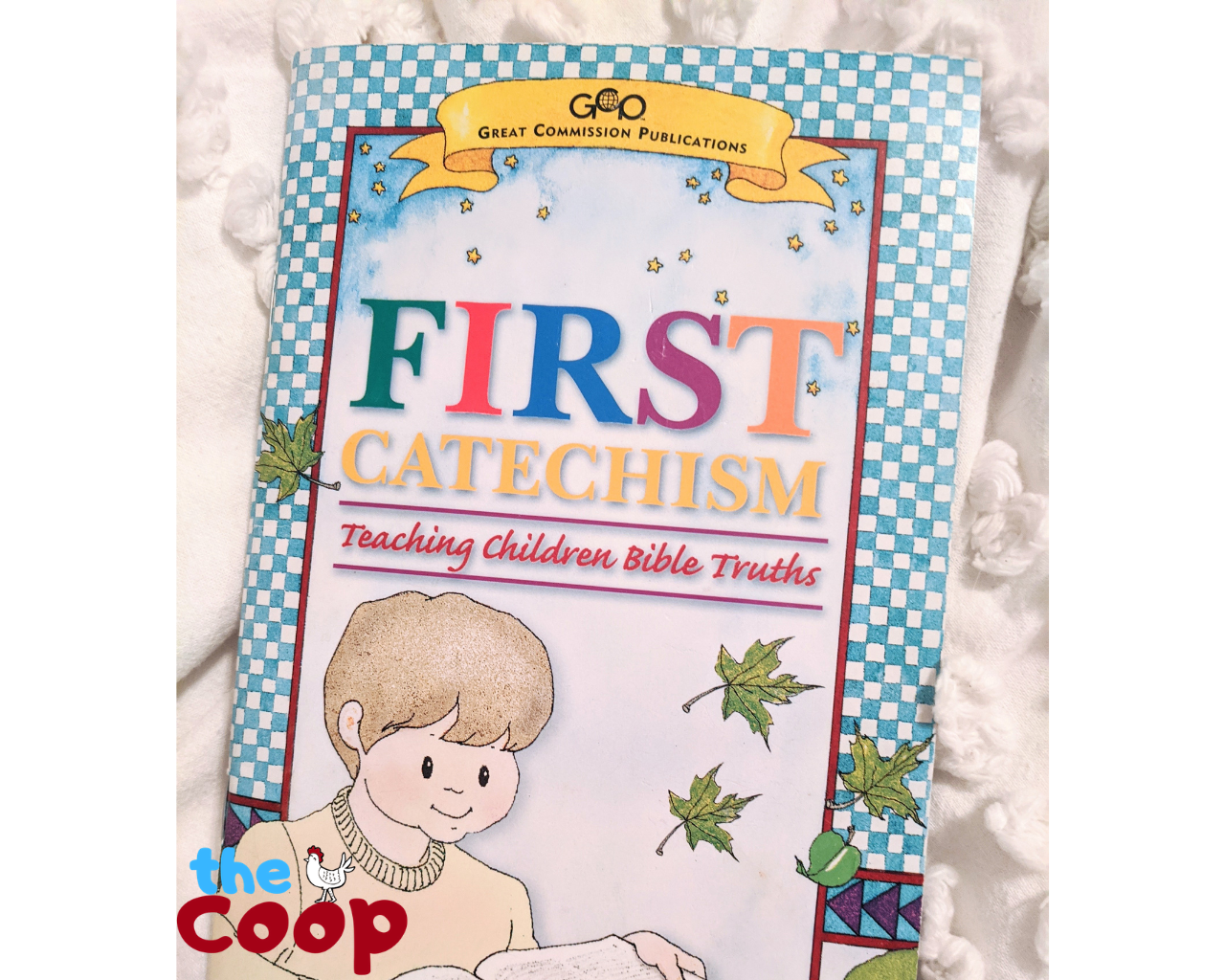The Architecture of the Christian Faith: A Simple Way to Teach our Kids
(Some links may be affiliate links. We may get paid if you buy something or take an action after clicking one of these.)
For both the Spouse and me, our faith is the foundation of who we are. We know the unconditional love of God, the hope our God gives us for our future, and the strength He gives us to fulfill His calling and purpose in our lives - and we want our kids to have that same assurance. So, when our kids were about 2 years old, we started educating them about the Christian faith. We started with teaching them to know and memorize these questions:
Question #1: Who made you?
Answer: God.
Question #2: What else did God make?
Answer: God made all things.
Question #3: Why did God make you and all things?
Answer: For His own glory.
Question #4: How can you glorify God?
Answer: By loving him and doing what He commands.
Question #5: Why are you to glorify God?
Answer: Because He made me and takes care of me.
As homeschool families we get to choose what we teach our kids, for the most part. That gift is something that extends to the spiritual world as well – and for us, it’s Christianity. For all you out there who want to teach their kids the main elements of the Christian faith – I’m going to tell you about something that many protestant Christians do not know about, that many could benefit learning from (of all ages), and from which many would definitely have a better understanding of their own faith. And, this deeper knowledge and understanding brings deeper joy and intimacy in one’s relationship with Christ. I know you are all sitting on the edge of your seat – it’s The Children’s Catechism. It’s available free online, or you can get this cute little book that our church gave each of our kids (it also has some coloring pages and fits in their little hands well).
So, what is a Children’s Catechism? The word catechism is: “a summary of the principles of Christian religion in the form of questions and answers, used for the instruction of Christians.” (Google dictionary). So, a children’s version is just simpler, easier to read, and in easier chunks to memorize.
There are various versions of catechisms, depending on which sect of the Christian faith it subscribes to. The one we use, and the one I’m recommending, is the Protestant catechism, based upon the Protestant doctrine that was developed from the teachings of Martin Luther, John Calvin, and others. It addresses topics like who is God, the fall of man, the Savior of man, the main two covenants, the offices of Christ, the Ten Commandments, the Lord’s Prayer, the sacraments, and our hope for our future. It introduces concepts and theological language such as original sin, the atonement, regeneration, justification, and more. Just like many other academic subjects, the Christian faith has a whole other set of terms and ideas that is helpful for Christians to learn for understanding their faith and being able to converse in an informed manner. This introduces that language to your children, so they can read and enjoy their own faith’s theology as well as theological stories and history in a much deeper way when they are older.
What I love about this little, simple book is that there are 150 questions and answers for children to learn and memorize, so when they themselves or others ask these very common questions, they can answer them, themselves!
For example:
Question 6: “Is there more than one God?”
Answer: “No, there is only one true God.”
Question 7: “In how many persons does this one God exist?”
Answer: “In three persons.”
Question 8: “What are they?”
Answer: “The Father, Son, and Holy Spirit.”
Most Christian children know these answers, but this method helps them to have it organized well in their brain. This next little anecdote happened when I was teaching our 4-5 year old Sunday School class. One of my students came to me very confused. She said, “Miss Mandi. Eli said that there are two Gods. Are there?” And so I asked her question #6. And she answered it herself, without pause, “No, there is only one true God.” And we went through that entire memorized script together (shown above) of questions and answers 7-8. Then I asked her, “Are you still confused?” And she said, “No. I know there is only one true God.”
Let’s move back in time 18 years.
Back when I was not a parent, and barely married just about one year, my husband was a full-time seminary student at Westminster Seminary California (WSC), taking about 72 units of education in theology, biblical languages, and church history. I noticed that our church (located on the seminary campus) was teaching the kids and having them memorize The Children’s Catechism and the Westminster Shorter Catechism (depending on age).
I remember asking one of the WSC professors (also our church elder), “Why are we teaching the catechism? Why can’t they just memorize Bible verses only…Why both?”
His response made perfect sense to me.
He gently, and softly said (as I remember it), “The catechism gives our kids the architecture of their faith. It is the blueprint, the foundation, the studs of our faith. Then, as they get older and learn more about their faith and experience the joys amidst their struggles, they can have strong walls to hang their pictures on, and they have a strong foundation to be able to move in their furniture. But without the blueprints, the foundation, and the strong walls, their faith can crumble very easily as they hang up their pictures and move in their furniture. It won’t withstand the storms.”
That was about 18 years ago, and it has stuck with me all that time. Since my kids were born, we have sung the catechism song, Teach them the Faith by Dan and Karen Vitco, and have asked our children to memorize The Children’s Catechism since they were about 3-4 years old, studying and memorizing about one or two questions and answers per week or so. When questions come up, we are all able to answer their questions – because the answers are stored in our brain. Do they understand all of it? No. But someday they will. And that’s when they wallpaper their walls, hang their curtains, and move their heavy furniture into their strong houses with the difficult, the joyous, the painful, the peaceful, the loving, and the hateful experiences and people of their life – and it will stand. Their house will stand in hope because they know their Father in heaven who loves them unconditionally and forgives them unconditionally. They will know Him, not because they can “feel” Him at a certain point in time, but because they have gotten to know who He is through learning what He is about, what He came to do, and how much He loves them. A Father who required nothing of them – who loved them first, and adopted them first as His children.
When our kids get older, we plan to migrate to the Heidelberg Catechism (You can learn more about it here.) I love the first question and answer especially (Lords Day 1):
Question #1: What is your only comfort in life and death?
Answer: That I am not my own, 1but belong with body and soul, both in life and in death, 2to my faithful Saviour Jesus Christ. 3He has fully paid for all my sins with his precious blood, 4and has set me free from all the power of the devil. 5He also preserves me in such a way 6that without the will of my heavenly Father not a hair can fall from my head; 7indeed, all things must work together for my salvation. 8Therefore, by his Holy Spirit he also assures me of eternal life 9and makes me heartily willing and ready from now on to live for him. 10
(1.1 Cor 6:19, 20, 2.Rom 14:7-9, 3.1 Cor 3:23; Tit 2:14, 4.1 Pet 1:18, 19; 1 Jn 1:7; 2:2, 5.Jn 8:34-36; Heb 2:14, 15; 1 Jn 3:8, 6.Jn 6:39, 40; 10:27-30; 2 Thess 3:3; 1 Pet 1:5, 7.Mt 10:29-31; Lk 21:16-18, 8.Rom 8:28, 9.Rom 8:15, 16; 2 Cor 1:21, 22; 5:5; Eph 1:13, 14, 10.Rom 8:14)
When I dwell on all the things we need to teach our children - academic subjects, life skills, music, art, how to drive, and more - I think about how out of all of that, our children’s biblical and theological education and training is the most important, and it sometimes, for many of us, gets put to the side for just Sundays. But really, if we truly value our faith, it should be daily. And I love that I have this little book to include in my “Dailies,” so that I can at least catechize my children on a daily basis. Because, as question #135 says,
Question #135: What did Jesus say about little children?
Answer: “Let the little children come to me, and do not hinder them, for the kingdom of heaven belongs to such as these.”



